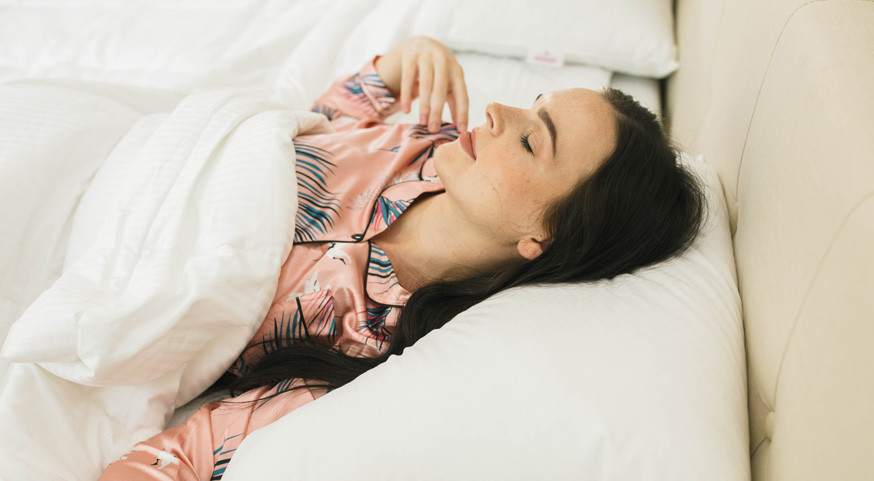Posted by Matt Cardoni on 2nd Apr 2024
Best Pillows for Back Sleepers
Most of us spend a significant amount of time sleeping on our backs throughout the night: studies show most people spend about 38% of their sleeping time on their backs. However much time you spend sleeping on your back, it’s important to have some back sleeper pillows on hand for guests and/or family members who sleep on their back. This unique sleep style may help with smoother skin, decreased lumbar pain, and better sleep quality.
Benefits of back sleeping
One of the most significant benefits of back sleeping is reducing pressure on your spine, neck, and hips. Because this position resembles standing, it helps keep your spine neutral throughout the night. Sleeping on your back may also benefit your face, breathing, and overall comfort. The top advantages of sleeping flat on your back are:
- Correct spinal alignment: Sleeping on your back may help maintain the natural curvature of the spine, reducing pain and discomfort.
- Minimized facial wrinkles: Sleeping on your back can help prevent the formation of facial wrinkles and lines, as there is no pressure on the face for hours at a time.
- Fewer breakouts and acne: Without your face pressed against a pillow, your skin can breathe and isn’t subjected to the dirt, oil, and bacteria that accumulate on pillowcases.
- Reduced pressure points: Laying flat on your back helps distribute body weight evenly, reducing the pressure on specific areas of the body.
- Improved breathing: While there are studies with contrasting results, back sleeping has been shown to take pressure off the diaphragm, allowing for deep breathing that other positions may constrict. Slow deep breathing also improves melatonin production for better sleep.
Should back sleepers use a pillow?
Yes, back sleepers should use a pillow to support the head and neck. Without a pillow, the head can sink too low, causing strain on the neck. A pillow that is too high can cause the head to tilt upwards, leading to discomfort and pain. Therefore, selecting a back sleeper pillow is essential for optimal comfort and support.
What are the best pillows for back sleepers?
Back sleepers should sleep on a medium-density pillow with a low to medium loft. This ensures the right amount of support without hyperextending the head and neck. In other words, back sleepers should select pillows with a medium height (3-5 inches) and medium firmness to cradle the spine's natural curvature.
A few of our top recommendations for back sleeper pillows are the Downlite 3 in 1 Adjustable Goose Down Pillow, the 50/50 Down & Feather Soft/Medium Hotel Pillow for Back Sleepers by DOWNLITE®, and the PrimaLoft® Signature Down Alternative Medium Pillow for Back Sleepers (Hypoallergenic). These pillows are specifically designed for back sleepers. Each allows the head to sink in just a little for comfort while remaining supported enough for proper alignment.
Read our Pillow Buying Guide for more information and tips on selecting the right pillow.
Additional tips for back sleeping
Selecting your sleep position is a personal choice. Interested in giving back sleeping a try for the potential health benefits? Try the following tips when making the switch:
- Choose the right pillow: Not all pillows are created equal. The best pillow for back sleepers is medium height and medium loft to keep the head in a neutral position.
- Use a pillow to support the knees: Placing a pillow under the knees can help reduce strain on the lower back and promote spinal alignment.
- Keep the room cool: Sleeping in a cool room can help improve sleep quality and promote relaxation.
- Relax your shoulders: Try to consciously melt the shoulders and avoid tensing them.
- Practice good sleep hygiene: Establishing a consistent sleep schedule and avoiding stimulants like caffeine or electronics before bed can help improve sleep quality.
- Be patient: It may take some time to adjust to sleeping on your back if you’re not used to it. With a little determination and consistency, your body will likely adjust to your new habit.

